A conure is a great bird to own, providing years of enjoyment and companionship. These long-lived birds are beautiful to look at and quite the clown.
There are so many conures available in the pet trade that it can be challenging to decide which conure is right for you.
 The Sun Conure is a striking bird with bright orange and yellow feathers compared to the green and red coloration of the Green Cheek Conure.
The Sun Conure is a striking bird with bright orange and yellow feathers compared to the green and red coloration of the Green Cheek Conure.
Both birds require a similar diet rich in seeds, fruits, and vegetables and require a similar-sized cage.
The Sun Conure tends to be more affectionate, while the Green Cheek Conure will be a more active bird. The conure is a great bird that is highly intelligent.
These birds can routinely learn to speak between 15, and 20 human words yet are relatively quiet in the home.
Conures are loving birds, but Green Cheek Conures can tend to be nippy when they are unhappy.
The Sun Conure enjoys cuddling with all people, making this an affectionate bird better suited for a family with children.
How Does Diet Differ Between a Green Cheek and Sun Conure?
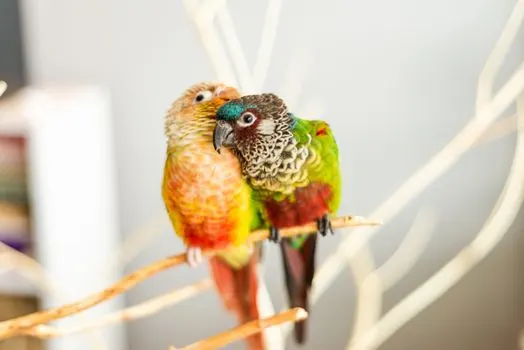 Most conures living in the wild will eat a balanced diet of seeds, fruit, and vegetables. It is essential to mimic this same diet for your pet’s conure.
Most conures living in the wild will eat a balanced diet of seeds, fruit, and vegetables. It is essential to mimic this same diet for your pet’s conure.
The diet is remarkably similar between the Green Cheek and the Sun Conure. You’ll want to give your bird a high-quality seed or pellet diet supplemented with plenty of fresh fruits and vegetables.
Some great fresh options for your conure include carrots, apples, berries, melons, or broccoli.
Giving your bird a variety of fruits and vegetables will help give it the necessary vitamins and minerals it needs to be healthy.
Although commercially produced bird seed mixes are readily available, you’ll want to avoid using seed as the only food option for your bird.
Avoid giving your conure meat or dairy, and always be sure to give your bird plenty of fresh options.
If your bird hasn’t eaten the fresh food you put in its cage, be sure to remove it within a few hours, so the food doesn’t spoil. Avocados and fruit seeds are not healthy for your pet’s conure.
Do Green Cheek and Sun Conures Need The Same Amount of Exercise?
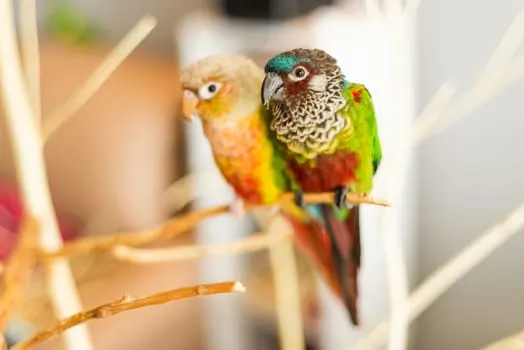 The Sun Conure is an active bird that appreciates time spent out of the cage. The bird needs regular enrichment and attention and doesn’t do well when left to its own devices.
The Sun Conure is an active bird that appreciates time spent out of the cage. The bird needs regular enrichment and attention and doesn’t do well when left to its own devices.
This bird can quickly become lonely and depressed if it is not given enough social interaction and exercise.
Sun Conures do well as pairs and can be paired with other conures of similar size, pending they are of the opposite sex.
The Sun Conure is an affectionate bird that needs slightly less exercise than the Green Cheek Conure. Comparatively, the Green Cheek Conure is a clown of a bird that is ready to perform silly antics.
This bird has loads of energy and needs plenty of exercise. The Green Cheek Conure can become affectionate with a human owner and enjoy the company of another similarly sized conure.
When it comes to time spent outside the cage exploring and exercising, the Green Cheek Conure will need slightly more exercise than the Sun Conure.
Which Bird Is Easier to Find?
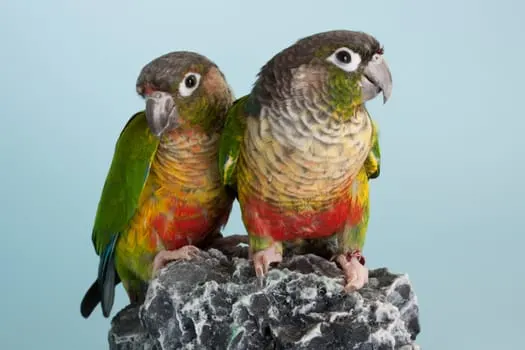 Locating a healthy conure from your local shelter, pet store, or breeder can be easy if you are looking for a common conure. Green Cheek Conures are very readily available and easy to find.
Locating a healthy conure from your local shelter, pet store, or breeder can be easy if you are looking for a common conure. Green Cheek Conures are very readily available and easy to find.
These birds commonly appear in pet stores around the country and are often offered at fair prices compared to other conures.
The Sun Conure can be very difficult to find, especially in a pet store. These are prized birds due to their sweet personality and stunning feather coloration.
If you are trying to find a Sun Conure, you may have the best luck contacting a local breeder that has knowledge of this specific bird.
If a breeder does not have any baby Sun Conures for sale, you may be able to adopt an older or potentially non-breeding Sun Conure.
Expect to pay a hefty price for your Sun Conure. These birds are rare and highly desired by bird enthusiasts.
What Cage Do I Need for a Green Cheek Conure?
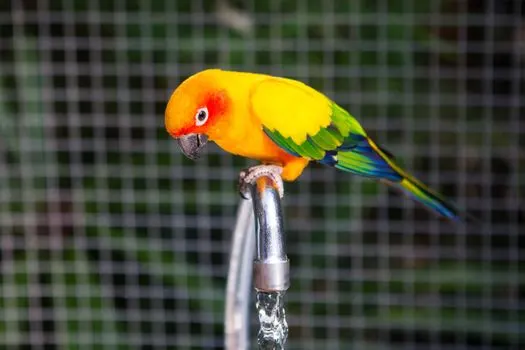 When choosing a cage for your Green Cheek Conure, you’ll want to select an angular cage, like a square or a rectangle.
When choosing a cage for your Green Cheek Conure, you’ll want to select an angular cage, like a square or a rectangle.
Not only are round cages usually smaller, but they can sometimes confuse a bird that is trying to establish reference points throughout the cage.
A single Green Cheek Conure will need a cage at least 24 x 24 inches and at least 30 inches tall.
If you plan to house more than one bird together, you’ll need to invest in a significantly larger cage, so both birds have enough room to play, exercise, and eat.
What Cage Do I Need for a Sun Conure?
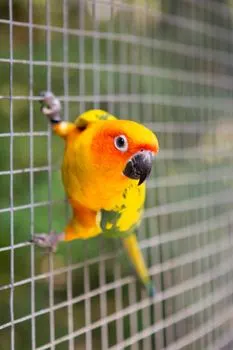 Sun Conures are very similar to Green Cheek Conures regarding cage requirements. This bird is an acrobat and loves to fly around the cage, jumping from perch to perch.
Sun Conures are very similar to Green Cheek Conures regarding cage requirements. This bird is an acrobat and loves to fly around the cage, jumping from perch to perch.
Although the Sun Conure is small, it will need a relatively large cage to call home. The minimum cage size for a Sun Conure is 24 x 24 inches and at least 30 inches high.
Ensure to get a larger enclosure if you plan to house more than one conure in the cage.
Which Bird Has Brighter Coloration, a Green Cheek or a Sun Conure?
 When choosing a brightly colored pet bird, finding something brighter than a Sun Conure is hard.
When choosing a brightly colored pet bird, finding something brighter than a Sun Conure is hard.
These gorgeous yellow, orange, and green birds are bold and beautiful, making them the jewel of the bird world.
Although the Sun Conure is the queen of coloration, the Green Cheek Conure shouldn’t be ignored.
This conure species offers several bright and stunning coloration choices, many featuring bold greens and reds. Some color patterns will even have flecks of blue and swatches of gold feathers.
Can I Teach My Green Cheek or Sun Conure to Talk?
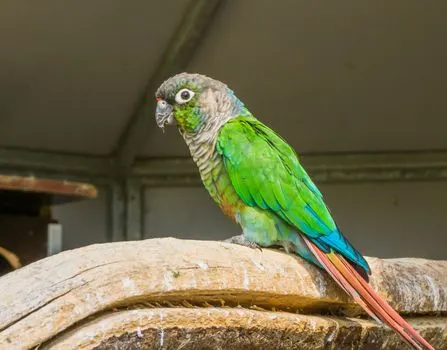 The Sun Conure is a pretty quiet bird compared to other birds that can learn hundreds of words or phrases.
The Sun Conure is a pretty quiet bird compared to other birds that can learn hundreds of words or phrases.
While prone to an occasional squawk, this bird is about as noisy as a canary and has a limited ability to learn words.
The Sun Conure may learn to say a few words but is not known to be a big talker, even after the bird learns the words.
Similarly, the Green Cheek Conure is not very talkative but will be slightly louder than the Sun Conure. This conure species can learn between 15 and 20 different words and will repeat them occasionally.
Though also not one of the more boisterous birds, the Green Cheek Conure is slightly louder and more talkative than the Sun Conure.
Which Bird Is Friendlier?
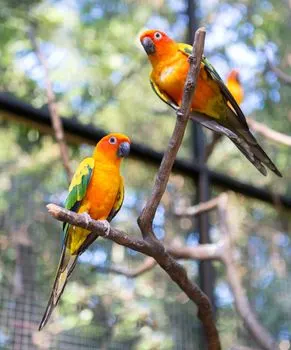 Conures are known to be friendly and affectionate birds that are perfect for a single owner or a family. Sun Conures tend to be friendlier than Green Cheek Conures.
Conures are known to be friendly and affectionate birds that are perfect for a single owner or a family. Sun Conures tend to be friendlier than Green Cheek Conures.
The Sun variety is happy to cuddle with owners and form a deep and genuine bond with the entire family.
Unlike other birds that will attach to just one person, the Sun Conure tends to bond with family as a whole equally.
The Green Cheek Conure is still a friendly and social bird and enjoys playing with all family members. This bird thrives on social interaction and is happy to receive any and all attention.
However, the Green Cheek Conure has been known to nip at people when they are stressed, tired, or simply have had enough attention.
Because this bird is known to nip on occasion, it is not always recommended for families with small children.
Related Questions
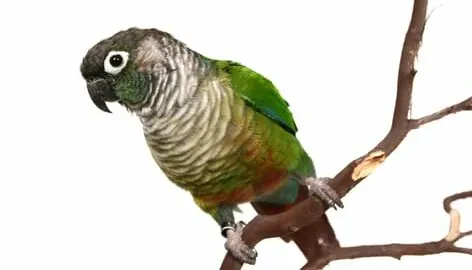 Can I take my bird outside?
Can I take my bird outside?
Taking your pet bird while still in its enclosure outdoors is a wonderful way to help give your bird some enrichment. Conures benefit from natural sunlight and enjoy hearing other birds in the wild.
The best temperature for your conure is between 70 degrees and 80 degrees with little wind. Put your birdcage in part shade so that it doesn’t become overheated.
You should never take your pet bird outside without some type of restraint.
What is the difference between a conure and a parakeet?
It is a common mistake for people to believe that conures and parakeets are interchangeable. In fact, even specific species will be double-labeled as both a conure and a parakeet.
A Green Cheek Conure can also be called a Green Cheek Parakeet. In reality, these are two very different groups of bird species.
All conures are a type of parrot, but not every parrot is a conure. The same can be true for conures. Every parakeet is a type of conure, but not every conure is a parakeet.
Related Guides
Our team is composed of pet care professionals, veterinarians, and pet owners. To date, we’ve conducted thousands of hours of research to publish the most accurate pet information.
Most of the writers on our site are vets with 10+ years of clinical experience, ranging from small practice, to equine practice, academia, and surgery. Our goal is to help every pet owner get the information they seek about their dear companions.

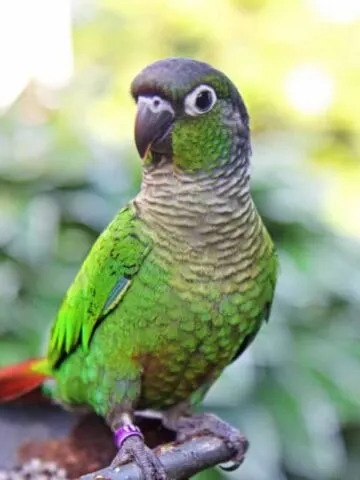

Leave a comment
You must be logged in to post a comment.